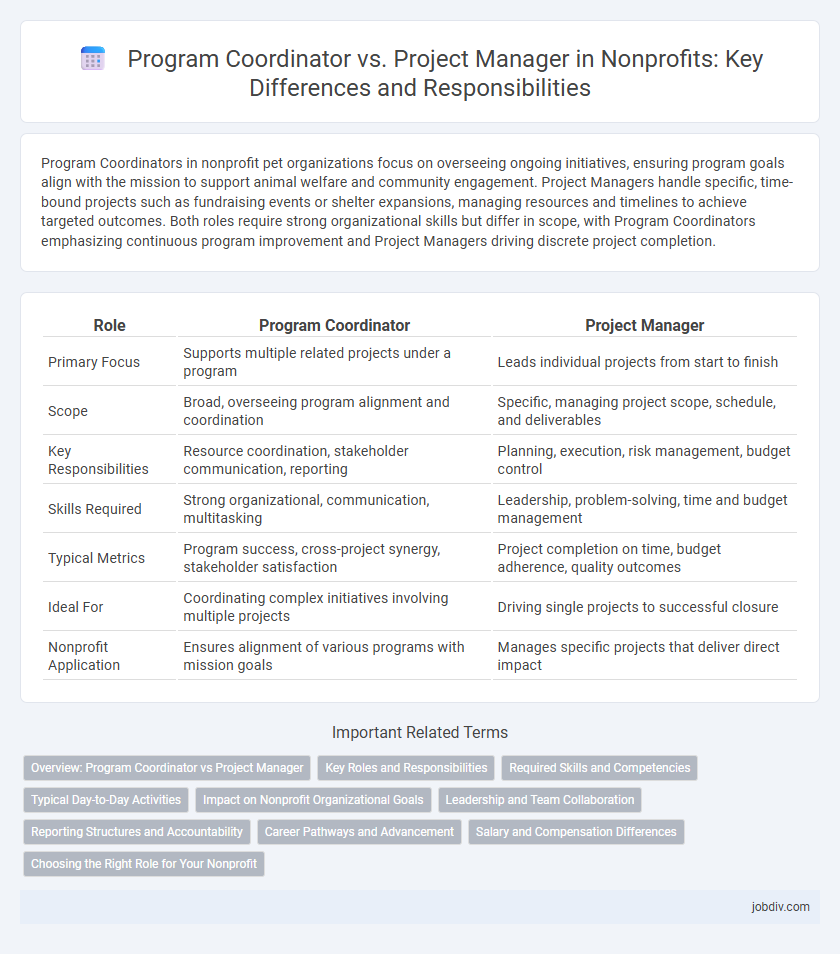Program Coordinators in nonprofit pet organizations focus on overseeing ongoing initiatives, ensuring program goals align with the mission to support animal welfare and community engagement. Project Managers handle specific, time-bound projects such as fundraising events or shelter expansions, managing resources and timelines to achieve targeted outcomes. Both roles require strong organizational skills but differ in scope, with Program Coordinators emphasizing continuous program improvement and Project Managers driving discrete project completion.
Table of Comparison
| Role | Program Coordinator | Project Manager |
|---|---|---|
| Primary Focus | Supports multiple related projects under a program | Leads individual projects from start to finish |
| Scope | Broad, overseeing program alignment and coordination | Specific, managing project scope, schedule, and deliverables |
| Key Responsibilities | Resource coordination, stakeholder communication, reporting | Planning, execution, risk management, budget control |
| Skills Required | Strong organizational, communication, multitasking | Leadership, problem-solving, time and budget management |
| Typical Metrics | Program success, cross-project synergy, stakeholder satisfaction | Project completion on time, budget adherence, quality outcomes |
| Ideal For | Coordinating complex initiatives involving multiple projects | Driving single projects to successful closure |
| Nonprofit Application | Ensures alignment of various programs with mission goals | Manages specific projects that deliver direct impact |
Overview: Program Coordinator vs Project Manager
A Program Coordinator oversees multiple related projects to ensure alignment with the nonprofit's strategic goals, managing resources and communications across teams. A Project Manager focuses on executing specific initiatives within set timelines, budgets, and scopes to achieve targeted outcomes. Both roles require strong organizational skills, but the Program Coordinator operates at a higher level of program integration and long-term impact.
Key Roles and Responsibilities
Program coordinators in nonprofits oversee multiple projects, ensuring alignment with organizational goals, managing resources, and coordinating communication between teams and stakeholders. Project managers focus on the execution of individual projects, managing timelines, budgets, and deliverables to meet specific objectives. Both roles require strong organizational skills, but program coordinators emphasize strategic oversight while project managers prioritize tactical implementation.
Required Skills and Competencies
Program Coordinators in nonprofits require strong organizational skills, communication abilities, and a deep understanding of program goals to effectively oversee multiple initiatives and ensure alignment with the organization's mission. Project Managers must demonstrate expertise in project planning, resource allocation, risk management, and leadership to drive specific projects from inception to completion within scope, time, and budget constraints. Both roles demand proficiency in stakeholder engagement, problem-solving, and adaptability to dynamic nonprofit environments.
Typical Day-to-Day Activities
A Program Coordinator in a nonprofit typically manages multiple ongoing initiatives, ensuring alignment with organizational goals, coordinating resources, and facilitating communication among various stakeholders. In contrast, a Project Manager focuses on the execution of specific projects, overseeing timelines, budgets, and deliverables to meet precise objectives. Both roles require strong organizational and leadership skills but differ in scope and strategic versus tactical responsibilities.
Impact on Nonprofit Organizational Goals
Program Coordinators align community outreach and service delivery to enhance program effectiveness and directly support nonprofit organizational goals by fostering stakeholder engagement and resource allocation. Project Managers ensure the timely execution of specific initiatives within nonprofit projects, optimizing operational efficiency and meeting predefined milestones critical to overall mission success. Both roles collaboratively drive impact by balancing strategic alignment and tactical implementation, strengthening the nonprofit's capacity to achieve sustainable social outcomes.
Leadership and Team Collaboration
Program Coordinators in nonprofits focus on fostering leadership by guiding multiple ongoing initiatives and ensuring alignment with the organization's mission, while Project Managers concentrate on detailed execution and timely delivery of specific projects. Both roles require strong team collaboration, but Program Coordinators emphasize cross-functional coordination and strategic communication, whereas Project Managers drive task-specific teamwork and resource management. Effective leadership in nonprofit settings depends on the Program Coordinator's ability to inspire and unify diverse teams, complemented by the Project Manager's skill in organizing and motivating project-level contributors.
Reporting Structures and Accountability
Program Coordinators in nonprofits typically report to Program Directors or Senior Managers, focusing on the ongoing implementation and oversight of specific initiatives within broader programs. Project Managers often report to Project Directors or Executive leadership, managing discrete projects with defined timelines, budgets, and deliverables, ensuring strict adherence to goals. Accountability for Program Coordinators centers on maintaining the quality and consistency of program activities, while Project Managers are held responsible for the successful completion of individual projects within scope, time, and cost constraints.
Career Pathways and Advancement
Program Coordinators in nonprofits typically focus on organizing and supporting specific initiatives, developing skills in communication, stakeholder engagement, and logistics, which serve as a foundation for advancing to a Project Manager role. Project Managers oversee larger projects or multiple programs, requiring expertise in budgeting, strategic planning, and leadership, making this role a pivotal step toward senior management or director positions. Career pathways often lead from Program Coordinator through Project Manager to roles such as Program Director or Executive Director, emphasizing increased responsibility and leadership in nonprofit management.
Salary and Compensation Differences
Program Coordinators in nonprofit organizations typically earn between $45,000 and $60,000 annually, reflecting their role in managing ongoing initiatives and supporting program execution. Project Managers command higher salaries, ranging from $65,000 to $85,000, due to their responsibility for overseeing specific projects, budgeting, and strategic planning. Compensation packages for Project Managers often include performance bonuses and additional benefits, highlighting the increased leadership demands compared to Program Coordinators.
Choosing the Right Role for Your Nonprofit
Selecting the right role between Program Coordinator and Project Manager in a nonprofit depends on organizational needs and goals; Program Coordinators typically oversee multiple ongoing initiatives to ensure alignment with the nonprofit's mission, while Project Managers focus on specific projects with defined timelines and deliverables. The Program Coordinator's responsibilities include stakeholder engagement, resource allocation, and program evaluation, which foster long-term impact across various services. In contrast, the Project Manager excels in managing detailed project plans, risk mitigation, and cross-functional team coordination to achieve short-term objectives efficiently.
Program Coordinator vs Project Manager Infographic

 jobdiv.com
jobdiv.com